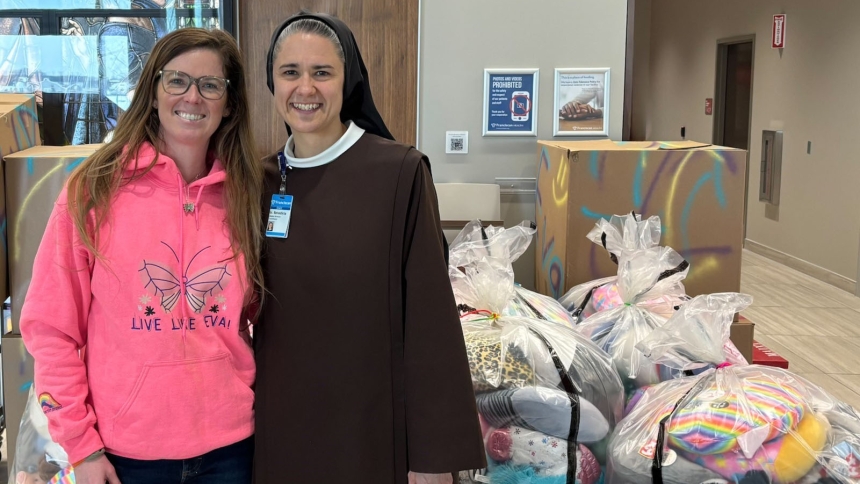
WASHINGTON (CNS) - TV viewing has gone up this spring. For some reason.
Even men who love to watch the sports that aren't being played or broadcast have found acceptable substitutes, according to the Nielsen rating service. The Detroit NBC affiliate reported viewership not seen since 2005, when "ER" and the first incarnation of "Will & Grace" were the last vestiges of NBC's once-formidable "Must-See TV" lineup.
Not only are ratings up on TV, Netflix reported that 16 million new subscribers were added just in the past month.
What does this portend? In a universe of choice, there are galaxies of bad choices that can be summoned with the push of a few buttons on a clicker.
However, Netflix also has responded to consumer demand for more stringent parental controls.
Netflix has made the "Dirty Dozen" list of the National Center on Sexual Exploitation the past couple of years, said Dawn Hawkins, the organization's senior vice president and executive director, primarily for original content with "gratuitous nudity and sexual violence" with little notice to viewers of said content, plus poorly designed parent controls.
"We applaud them for improving their parental controls the past two years. Last year they did a big wave of improvement that allowed parents to block content based on the rating and to have a PIN to put in if something's above that rating," Hawkins said. But the improvements were cumbersome, discouraging many who would otherwise make use of them, she added.
But by April, Netflix upgraded the controls. "You can lock your users into a specific profile. You can set the standards you want per profile," Hawkins told Catholic News Service. "If you have an adult, a parent's profile, it's not as cumbersome for you to use the platform. I was willing to put in the cumbersome (work) of putting in the PINs every time, but some parents won't do that."
Thanks to the proliferation of personal technology in the form of laptops, tablets and smartphones, it may be too much to think that, in a universe of choices, that everyone will gather around the TV with a big bowl of popcorn and watch a program. One mom I know said she's got two teenage sons and a preteen daughter, so while she and her husband are fairly well satisfied, it's tougher getting the kids to agree on something that's neither out of bounds for one nor seemingly simplistic to another.
This leads to a lot of separate viewing habits, and in a remain-in-place scenario, those habits can grow entrenched more quickly since there's more opportunity to watch with most other activities scratched.
But, Hawkins reported, some of the leading social media sites have improved their parental controls as well.
"They've made a number of improvements on YouTube in terms of algorithms and what videos will be shown -- especially to kids who use the platform. It's really decreased the problematic, sexually explicit or violent content," she said. While not perfect, less is surfacing.
YouTube now also has a "restricted mode," which will remove more adult-themed content from being accessed. "It's a free built-in kind of tool. I just recommend every parent have that on," Hawkins said. "It's pretty easy to turn on." YouTube had been criticized for allowing sexual predators to post highly sexualized comments on otherwise innocuous videos of kids showing off their gymnastics or trampoline skills, thinking the only people interested would be their families and friends.
It was all of the predator lurking that got YouTube's parent company, Google, on the center's Dirty Dozen list. "That's the biggest company by far that worries me on a daily basis," Hawkins told CNS.
"Google Images is where so many of us (go) to get images or stock photos, lots of kids find images to use in school reports," she said, but when making an image request, some results would be flooded with hardcore pornographic photos. It was even worse, she added, if the image search request included just about any part of the anatomy.
Hawkins said Google executives at first declaimed responsibility, saying that the porn-image posters were merely exercising their First Amendment rights, but they ultimately changed their mind. While not all offensive imagery is gone, the volume is much less than before, she added, and body-part image searches will now more likely summon up illustrations from medical journals.
Separately, Google announced in an April 23 blog post that the names of the companies or people behind ads, as well as their countries of origin, will begin appearing on Google ads this summer. It is part of an effort to block scams and misleading ads that have led to complaints against the search engine giant to expand its verification policy.
A fast-growing social media site is TikTok, especially among those of middle school age. Even though one is supposed to be at least 13 years old to use the site, that requirement is observed mainly in the breach, so what are parents to do? It's become "a predator's paradise," Hawkins said.
TikTok "drastically changed" its security precautions in mid-April for users that operate on the platform. "You can separate from the discover section where kids post stuff," Hawkins noted, "which is really helpful. You can also stop strangers from messaging you. That's one of the main ways predators are operating. They send direct messages to kids. Having that feature of direct message change is really helpful."
TikTok also developed a new tool called "Family Pairing." "You connect an account to your child's account," Hawkins said. Because the change is so recent, she added, "I haven't had a chance to see how safe it really is, but it sounds like a really effective tool," but "I don't have full endorsement of it."
Hawkins said the best way to ensure that social media firms put parental controls that really control, Congress should pass the Earn It Act, introduced in the Senate by Richard Blumenthal, D-Connecticut, and Lindsey Graham, R-South Carolina. "It has tremendous bipartisan support," she added.
The courts had threw out most of the Communications Decency Act not long after it was passed in 1996, but Section 230 of the law still stands. It gives tech companies immunity, saying they're not responsible at all for the content that others upload to their website, according to Hawkins.
"It's an important law and we see the need for it, but where there are websites that are condoning this (predatory activity) or giving tips on how to get around the system and evade police, they do not deserve that kind of immunity," she said. "We must be able to balance privacy and security while creating safe spaces for the most vulnerable."
In another policy matter, the Parents Television Council asked the Federal Communications Commission to restore the "family hour" to prime-time TV. But the FCC, at its April 22 meeting, ignored the request.
The Parents Television Council had, in its own study of Netflix, found that 65% of its original or exclusive programming was rated TV-MA, with only 9% being rated TV-PG or TV-G.


